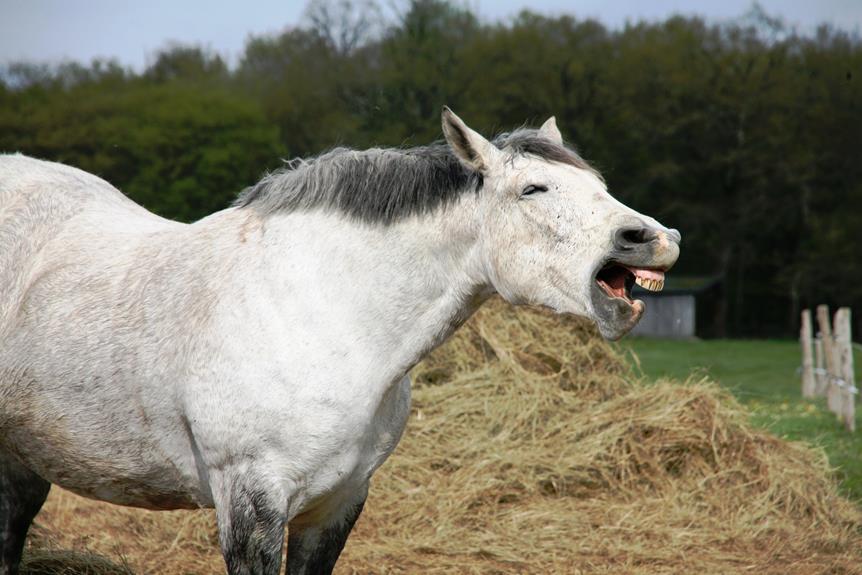Like a curious horse nibbling at the edge of a lush pasture, you may find yourself wondering if horses can eat broccoli. Well, the answer is not as straightforward as a simple yes or no. While broccoli can offer some nutritional benefits to horses, there are certain considerations to keep in mind.
So, saddle up and get ready to explore the world of equine broccoli consumption, as we unravel the potential advantages and precautions associated with this leafy green vegetable. Are you ready to discover if your four-legged friend can enjoy the occasional broccoli treat? Let's find out.
Key Takeaways
- Broccoli offers nutritional benefits for horses, including high fiber content, vitamin C, calcium, and minerals.
- Introduce broccoli gradually and feed in moderation to avoid digestive issues.
- Thoroughly wash and cut broccoli into small pieces to prevent choking hazards.
- Steaming or blanching broccoli can soften it and aid digestion, but avoid adding seasonings or sauces.
Nutritional Value of Broccoli for Horses
Broccoli offers a wealth of nutritional benefits for horses, supporting their overall health and well-being. While horses can eat broccoli, it's important to feed it to them in small amounts. This nutritious vegetable is packed with vitamins and minerals that can benefit horses in various ways.
For instance, broccoli is high in fiber, which is essential for healthy digestion in horses. Additionally, the vitamin C found in broccoli can help strengthen the immune system of horses, keeping them healthy and resilient. Furthermore, broccoli contains calcium and minerals that promote strong bones and teeth in horses. This is particularly important for young horses who are still growing and developing.
The antioxidants and anti-inflammatory compounds present in broccoli can also help reduce inflammation in horses, making it particularly beneficial for older horses or those with joint problems. However, it's important to monitor your horse's response to broccoli and ensure that they tolerate it well.
As with any new food, it's always best to introduce it gradually and observe any potential adverse reactions. In conclusion, broccoli can be a safe and nutritious addition to a horse's diet, offering a range of health benefits when fed in appropriate amounts.
Safety Considerations When Feeding Broccoli to Horses
When feeding broccoli to horses, it's important to consider their safety and potential risks. While broccoli can be a nutritious addition to a horse's diet, it should be given in small amounts and with caution. Here are some safety considerations when feeding broccoli to horses:
- Introduce broccoli gradually: Start by offering a small piece of broccoli and monitor your horse's reaction. Some horses may have sensitivities or allergies to certain foods, so it's important to introduce new foods slowly.
- Feed in moderation: While broccoli contains beneficial nutrients that can promote healthy digestion and support the immune system, feeding too much broccoli can cause digestive upset or even lead to gas or colic issues. Therefore, it should be fed as an occasional treat rather than a regular part of the horse's diet.
- Wash thoroughly: Always wash broccoli thoroughly to remove any pesticides or dirt before feeding it to your horse. This will help ensure that your horse isn't exposed to any harmful substances.
- Cut into small pieces: To prevent choking hazards, cut the broccoli into small, manageable pieces for your horse. This will make it easier for them to chew and swallow.
Benefits of Including Broccoli in a Horse's Diet
Including broccoli in a horse's diet can offer numerous benefits for their overall health and well-being. Broccoli is a nutritious and beneficial feed for horses when given in small amounts. Horse owners can take advantage of the many benefits broccoli provides to their equine companions.
One of the key benefits of including broccoli in a horse's diet is its rich source of vitamin C. This vitamin is essential for the horse's immune system, helping to strengthen it and protect against illnesses. Additionally, broccoli contains calcium and minerals that support strong bones and teeth in horses.
Moreover, broccoli is high in fiber, making it a great addition to a horse's diet for promoting healthy digestion. The fiber content aids in maintaining regular bowel movements and can prevent digestive issues.
Furthermore, the antioxidants and anti-inflammatory compounds found in broccoli can help reduce inflammation in horses. This can be particularly beneficial for older horses or those with joint problems, as it can alleviate discomfort and promote mobility.
When feeding broccoli to horses, it's important to offer it in small pieces to prevent choking hazards. Overall, including broccoli in a horse's diet can provide them with a nutritious and beneficial source of vitamins, minerals, and fiber, contributing to their overall well-being.
Preparing Broccoli for Horses
To properly prepare broccoli for your horse's diet, it's important to follow these steps:
- Wash the broccoli thoroughly to remove any pesticides or dirt. You want to ensure that the broccoli is clean and safe for your horse to eat.
- Cut the broccoli into small, manageable pieces. This will help prevent choking and make it easier for your horse to chew and digest.
- Steam or blanch the broccoli. This will soften the broccoli, making it more palatable for your horse. It will also help break down the tough fibers, making it easier to digest.
- Avoid adding any seasonings or sauces to the broccoli. While you may enjoy adding flavor to your own broccoli, these additions can be harmful to horses. Stick to plain, steamed or blanched broccoli for your equine friend.
Recommended Amount of Broccoli to Feed Horses
You should feed horses broccoli in moderation, as it's best considered as an occasional treat rather than a staple food in their diet. Broccoli can be a good source of nutrients to support the overall health of horses.
When introducing broccoli to a horse's diet, it's important to start with small amounts to avoid any digestive upset. The recommended amount of broccoli to feed horses is small, and it's generally advised to limit it to a few small pieces per day. It's crucial to monitor your horse for any adverse reactions when introducing broccoli, as some horses may be more sensitive to the vegetable.
Broccoli should be washed thoroughly and cut into small, manageable pieces. Ideally, it should be steamed or blanched before feeding to make it easier for the horse to chew and digest.
It's important to note that while broccoli is generally safe for horses to consume, feeding large quantities can cause digestive issues. If you have any concerns or questions about including broccoli in your horse's diet, it's recommended to consult with a veterinarian or equine nutritionist for specific dietary recommendations and guidance.
Frequently Asked Questions
What Vegetables Can Horses Not Eat?
Horses should avoid tomatoes and peppers due to potential digestive issues. Onions should be given sparingly to prevent anemia. Cauliflower is generally safe for digestion. Carrots provide nutritional benefits. Parsnips are a safe addition.
What Vegetable Is Good for Horses?
Carrots and apples are popular horse treats, providing essential nutrients. Leafy greens offer nutritional benefits for horses. Beets can be incorporated into a horse's diet. Sweet potatoes are a healthy addition. A balanced diet is crucial. Can horses safely consume cucumbers?
What Are Horses Not Allowed to Eat?
Horses should not eat certain foods due to common horse illnesses, nutritional requirements, and the horse's digestive system. Regular check-ups, proper grooming, and exercise are essential for a healthy horse. Various types of horse feed are available.
What Foods Are Harmful to Horses?
Horses should avoid common toxic plants such as avocados, chocolate, onions, tomatoes, grapes, garlic, and mushrooms. The safety of feeding horses potatoes is uncertain. Broccoli, like other vegetables in the brassica family, can cause gas and colic problems.
Conclusion
In conclusion, while horses can eat broccoli and receive nutritional benefits from it, it's important to introduce it gradually and feed it in moderation.
Broccoli is high in fiber, vitamin C, and essential vitamins and minerals, which support overall health and well-being.
However, some horses may not enjoy the taste or experience digestive upset, and feeding large amounts regularly can interfere with thyroid function.
It's recommended to consult with a veterinarian for any concerns about feeding broccoli to horses.



0 Comments